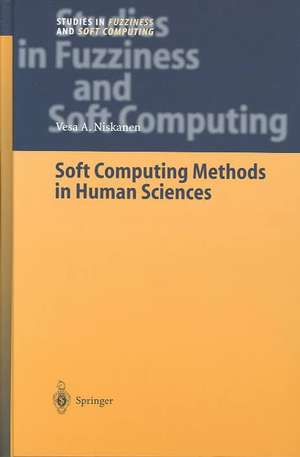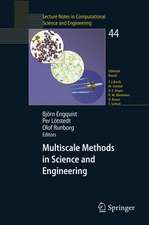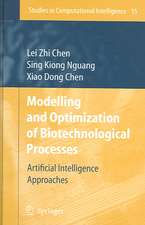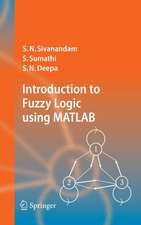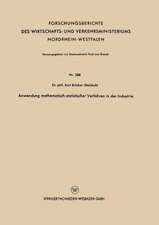Soft Computing Methods in Human Sciences: Studies in Fuzziness and Soft Computing, cartea 134
Autor Vesa A Niskanenen Limba Engleză Hardback – 19 aug 2003
| Toate formatele și edițiile | Preț | Express |
|---|---|---|
| Paperback (1) | 640.06 lei 6-8 săpt. | |
| Springer Berlin, Heidelberg – 15 dec 2010 | 640.06 lei 6-8 săpt. | |
| Hardback (1) | 646.43 lei 6-8 săpt. | |
| Springer Berlin, Heidelberg – 19 aug 2003 | 646.43 lei 6-8 săpt. |
Din seria Studies in Fuzziness and Soft Computing
- 20%
 Preț: 999.85 lei
Preț: 999.85 lei - 20%
 Preț: 653.06 lei
Preț: 653.06 lei - 20%
 Preț: 872.98 lei
Preț: 872.98 lei - 20%
 Preț: 930.57 lei
Preț: 930.57 lei - 20%
 Preț: 1051.00 lei
Preț: 1051.00 lei - 20%
 Preț: 992.44 lei
Preț: 992.44 lei - 20%
 Preț: 655.85 lei
Preț: 655.85 lei - 20%
 Preț: 1001.86 lei
Preț: 1001.86 lei - 18%
 Preț: 954.14 lei
Preț: 954.14 lei - 20%
 Preț: 330.10 lei
Preț: 330.10 lei - 20%
 Preț: 333.04 lei
Preț: 333.04 lei - 20%
 Preț: 997.56 lei
Preț: 997.56 lei -
 Preț: 391.61 lei
Preț: 391.61 lei - 20%
 Preț: 647.79 lei
Preț: 647.79 lei - 20%
 Preț: 986.01 lei
Preț: 986.01 lei - 18%
 Preț: 958.56 lei
Preț: 958.56 lei - 20%
 Preț: 996.40 lei
Preț: 996.40 lei - 20%
 Preț: 999.35 lei
Preț: 999.35 lei - 15%
 Preț: 646.43 lei
Preț: 646.43 lei - 20%
 Preț: 651.57 lei
Preț: 651.57 lei - 20%
 Preț: 997.89 lei
Preț: 997.89 lei - 15%
 Preț: 641.03 lei
Preț: 641.03 lei - 20%
 Preț: 1009.74 lei
Preț: 1009.74 lei - 20%
 Preț: 992.62 lei
Preț: 992.62 lei -
 Preț: 388.72 lei
Preț: 388.72 lei - 18%
 Preț: 1223.43 lei
Preț: 1223.43 lei - 20%
 Preț: 651.42 lei
Preț: 651.42 lei - 18%
 Preț: 951.59 lei
Preț: 951.59 lei - 18%
 Preț: 948.61 lei
Preț: 948.61 lei
Preț: 646.43 lei
Preț vechi: 760.50 lei
-15% Nou
Puncte Express: 970
Preț estimativ în valută:
123.70€ • 132.27$ • 103.13£
123.70€ • 132.27$ • 103.13£
Carte tipărită la comandă
Livrare economică 17 aprilie-01 mai
Preluare comenzi: 021 569.72.76
Specificații
ISBN-13: 9783540004660
ISBN-10: 3540004661
Pagini: 292
Ilustrații: XV, 272 p.
Dimensiuni: 156 x 234 x 21 mm
Greutate: 0.59 kg
Ediția:2004
Editura: Springer Berlin, Heidelberg
Colecția Springer
Seria Studies in Fuzziness and Soft Computing
Locul publicării:Berlin, Heidelberg, Germany
ISBN-10: 3540004661
Pagini: 292
Ilustrații: XV, 272 p.
Dimensiuni: 156 x 234 x 21 mm
Greutate: 0.59 kg
Ediția:2004
Editura: Springer Berlin, Heidelberg
Colecția Springer
Seria Studies in Fuzziness and Soft Computing
Locul publicării:Berlin, Heidelberg, Germany
Public țintă
ResearchCuprins
1. Towards Novel Methods in the Human Sciences.- 2. Brief Introduction to Fuzzy Set Theory.- 3. Concise Logopedics for Soft Computing Models.- 4. The Approximate Truth about the Degrees of Truth.- 5. Approximate Reasoning.- 6. Quantitative Data Examination.- 7. Soft Computing Models for Complex Systems.- 8. Towards Soft Computing Applications in Qualitative Research.- 9. Conclusions.- List of Figures.- List of Tables.- List of Boxes.- References.
Recenzii
From the reviews:
"Dr. Niskanens work opens new vistas in application of soft computing, fuzzy logic and fuzzy set theory to the human sciences. This book is likely to be viewed in retrospect as a landmark in its field" - Lotfi A. Zadeh, University of California, Berkeley.
"Niskanen … breaks new ground in soft computing, and his book is one of just a few studies that focus on soft computing methods and fuzzy logic with respect to applications in the human sciences, namely, the social and behavioral sciences. … Numerous figures and tables provide useful information throughout. Summing Up: Highly recommended. Upper-division undergraduates through faculty." (D. J. Gougeon, CHOICE, April, 2004)
"Dr. Niskanens work opens new vistas in application of soft computing, fuzzy logic and fuzzy set theory to the human sciences. This book is likely to be viewed in retrospect as a landmark in its field" - Lotfi A. Zadeh, University of California, Berkeley.
"Niskanen … breaks new ground in soft computing, and his book is one of just a few studies that focus on soft computing methods and fuzzy logic with respect to applications in the human sciences, namely, the social and behavioral sciences. … Numerous figures and tables provide useful information throughout. Summing Up: Highly recommended. Upper-division undergraduates through faculty." (D. J. Gougeon, CHOICE, April, 2004)
Textul de pe ultima copertă
This book considers Soft Computing methods and their applications in the human sciences, such as the social and the behavioral sciences. Soft Computing methods - including fuzzy systems, neural networks, evolutionary computing and probabilistic reasoning - are state-of-the-art methods in theory formation and model construction. The powerful application areas of these methods in the human sciences are demonstrated, including the replacement of statistical models by simpler numerical or linguistic Soft Computing models and the use of computer simulations with approximate and linguistic constituents.
"Dr. Niskanens work opens new vistas in application of soft computing, fuzzy logic and fuzzy set theory to the human sciences. This book is likely to be viewed in retrospect as a landmark in its field" - Lotfi A. Zadeh, Berkeley.
"Dr. Niskanens work opens new vistas in application of soft computing, fuzzy logic and fuzzy set theory to the human sciences. This book is likely to be viewed in retrospect as a landmark in its field" - Lotfi A. Zadeh, Berkeley.
Caracteristici
Concise and clear presentation of soft computing methods and their applications in the human sciences Presents a novel way of thinking, including fuzzy systems, neural networks, evolutionary computing and probabilistic reasoning with broad- ranged applications for human sciences Includes supplementary material: sn.pub/extras
